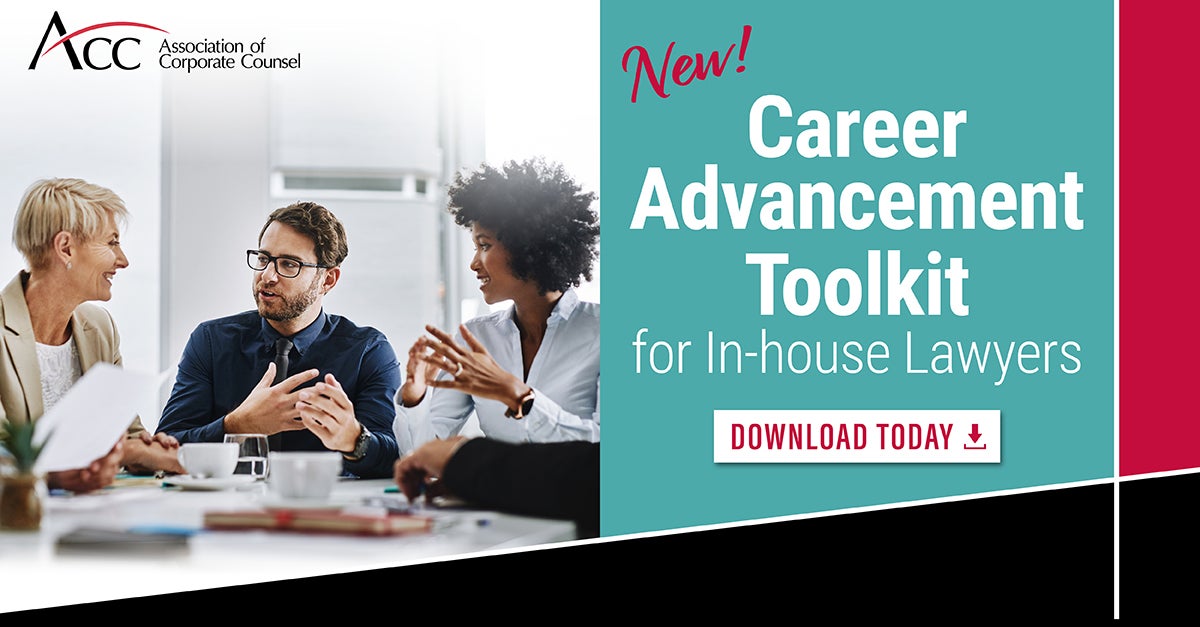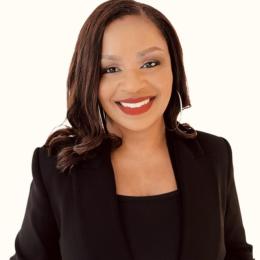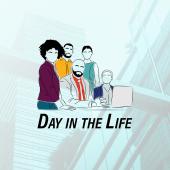Banner artwork by 1795262434 / Shutterstock.com
ACC provides a variety of professional development offerings to in-house counsel, including specifically tailored career coaching services. In addition to hosting an online Career Coaching Directory showcasing more than 50 diverse, professional career coaches located in the United States, Canada, Australia, New Zealand, Europe, Asia, and Africa, ACC is also partnered with Coaching Advocates. Through this partnership, ACC members gain access to a suite of professional coaching and development services, an expanded network of advocates, online programing, and events.
This series explores the dynamic coaching relationships between a few ACC members and their coaches, while introducing (or reintroducing) you to an exclusive benefits of ACC’s career development offerings. This time we explore the holistic coaching relationship between Valerie Boccadoro and Anjli Garg.

Counsel, Device and Financial Services Marketing, Verizon
Your Coach To Soar LLC
Coaching beginnings
“I’m a seasoned attorney, with many years of experience behind me,” began Valerie Boccadoro. “I’ve been practicing marketing, advertising, and trademark law in-house most of that time, which led me to join ACC and brought me to the Annual Meeting last year. There, I had the amazing opportunity to meet with an executive coach.” That coach was Anjli Garg, and the meeting proved to be the beginning of coaching relationship (and friendship) that goes a bit deeper than strategies for success and resume reviews.
“For me, the approach very much is that I’m coaching the whole person,” said Anjli, an attorney with 24 years of experience leading global legal teams who, while working in that capacity, received her coaching certification and began taking clients on the side. “I just loved it,” she said. Anjli’s journey shifted just last year when she transitioned into full-time coaching and workshop facilitation, and though previously involved with ACC, she attended the meeting for the first time as an executive coach in 2023. She loved the experience and is grateful it provided the opportunity to meet Valerie and become a part of her “journey in life.”
A holistic approach
One’s career can be a significant part of life’s journey. It’s estimated that the average person spends one-third of their lifetime working ( imagine how that can fluctuate for lawyers). It can be argued then, that while we strive to be professional, we can’t help but bring parts of our outside lives into the workplace, and further, that we thrive when allowed to show up authentically. This is why coaching the whole person is so important to Anjli. “The fact is that we bring all of ourselves into our jobs. So, when I'm working with someone, I’m working with them from the perspective of getting to the root of what is going on,” she said. “That involves not just employing tactical tools, but also identifying unconscious patterns and biases — those filters we’ve formed since childhood that inform what we believe is possible for us and possible in the world.”
The coach believes that once her clients unpack some of this, opportunities for growth become clearer and the vast possibilities for their career paths more tangible. That said, unconventional methods can sometimes help to identify those underlying issues, and part of bringing her authentic self to work can involve incorporating the holistic practices she’s also trained in, into her coaching practice.
“I’m an energy healer. I don’t advertise that because it’s not something that’s all that accepted in Corporate America,” explained Anjli, noting not wanting to tarnish her hard-earned credibility as a lawyer. However, when appropriate and welcomed by clients, leaning into holistic methods can greatly impact their ability to visualize positive changes in their career, and lives. “That’s the differentiator, and what puts her in a different league,” shared Valerie, referring to her coach’s “whole self” approach to coaching, and the authenticity with which she does it.
However, when appropriate and welcomed by clients, leaning into holistic methods can greatly impact their ability to visualize positive changes in their career, and lives.
Goal (and life) setting
Paired before the meeting, Anjli introduced herself via email, and asked Valerie to identify a few goals she’d like to discuss during the session, as well as what she expected to get out of it. Valerie wanted to talk through the different stages of her career; discuss strategies for networking and moving her career forward; and review her resume. Typical goals for a session that turned out to be anything but. “It was a totally different experience than I expected,” said Valerie.
Stating that Anjli was the first professional coach to follow up standard questions like “What did you like about this job, or why did you leave this company?” with more probing inquires like “What was the disposition of that job, how’d you leave, and what did you feel after you left?” Valerie admitted to being a little taken aback at first. When asked what she did before law school, she requested an explanation.
“I said to Anjli, 'Forgive me, but I’m not sure what this has to do with where I am and my legal career,' and she said, 'Because it’s all you. You can’t separate these things or segregate your past from what you want to work on in the present or to achieve in the future.' This kind of blew me away and I signed up!” Valerie recalls.
What to expect and advice for selecting your coach
When asked about the specifics of their sessions (i.e., how often the two meet, for how long, and if there’s “homework”), both point to flexibility and adaptability when it comes to scheduling sessions and any reflective work that comes out of them. For example, Anjli typically meets with clients once a week for about 60 minutes and bases any work to be done between sessions on client preference.
“Valerie and I would meet every other week or sometimes several weeks out, which I understand. It’s all about what’s working and what isn’t,” she said. Further, the last thing she wants to do is overload already busy clients. Therefore, Anjli often asks what they’d like to work on after a session, in addition to ending each session with the suggestion they identify key takeaways. “That helps solidify what they’re taking away, because when you’re in the thick of things, sometimes the mind glosses over the insights made.”
Praising her coach’s ability to seamlessly follow her lead, Valerie stopped short of referring to any after-session reflection as homework. “I think that people shy away from the idea of professional coaching because of that term homework,” she said. “It wasn’t something Anjli would mandate, but I’d think about our session the whole week and because that’s where I was, I’d prepare myself for the next one, unsolicited.”
When it comes to selecting a coach, Valerie believes the first indication of whether you’ve found your match comes down to rapport. “Had Anjli and I met, and we didn’t think there was a rapport, we wouldn’t have moved forward,” she said. “It’s really about connection, because it’s a partnership,” Anjli added. “I don’t have the answers. I’m here as the guide to help you find the answers that resonate and are aligned with you.”
Coaching as selfcare and its potential impact on mental health
In recent years, selfcare and mental health awareness for professionals have become a priority for many employers — a focus of countless conference sessions, seminars, and workshops. “There’s a movement to recognize how this profession affects us in every aspect of our lives,” said Valerie. “I recognize the need for mental health awareness, and I consider Anjli work to be selfcare.” That said, simply getting your resume reviewed or talking through strategies for career growth may not feel like selfcare, especially considering the tendency to compartmentalize work and homelife. These areas often overlap and impact each other however, and it’s normal to get overwhelmed or frustrated in either environment. Anjli suggests taking a step back to holistically identify what’s going on and where there may be misalignment, for example, before taking a drastic step like resigning.
“Nine times out of 10, there’s a lack of alignment in one place, and when it’s shifted, you’ve got space and relief,” she said.

Final thoughts
The benefits of having a coach? There are many, but one stands out for the lawyer. “The opportunity to connect the professional Valerie with the whole Valerie; that’s unique,” she said. “We’re so much more than our jobs and this profession. Anjli helped me realize that.” In a bit of on-the-spot coaching, Anjli asked her partner what that realization has helped her to do. Valerie replied, “It helped me move forward with more of a sense of peace and calm, and confidence that I’m being true to myself.”
Anjli altered her own career path to help other lawyers make similar shifts. “I wanted to be of service and enjoyed seeing people’s lives transform — seeing them freed from things they never thought they’d be freed from and achieve the goals they’ve always wanted to achieve. It gives me a lot of joy and is my selfish reason for becoming a coach.”
Asked to offer one piece of advice to in-house lawyers looking to make a change in their career and partner with a coach, Anjli emphasized that no one is broken, and her job isn’t to “fix” you. “I’m here to help you fly and soar,” she said. “Your Coach To Soar is my brand because that’s what I believe in — I’m here to help you discover that deeper you, so that you can get clear on your why, and where you want to go with ease.”
Learn more about Anjli Garg as well as other ACC Professional Development Coaches, and sign up for a complimentary 30-minute session! While you’re there, access career-related resources and more.




